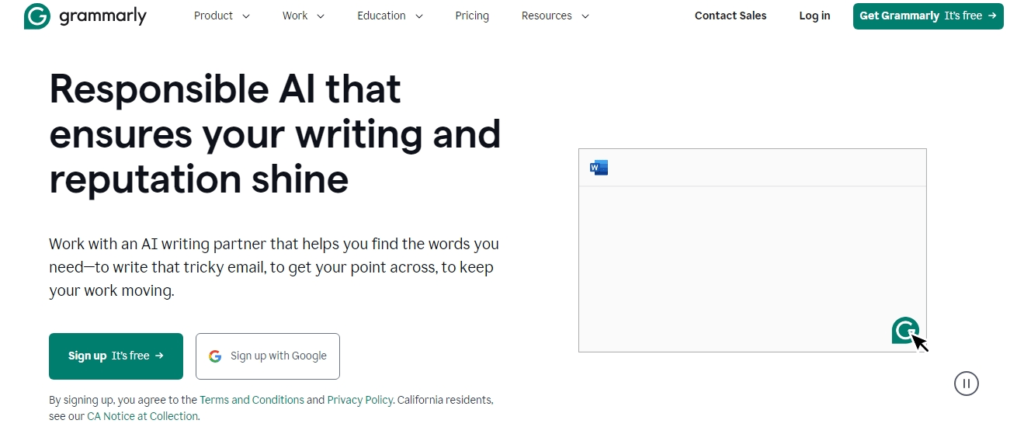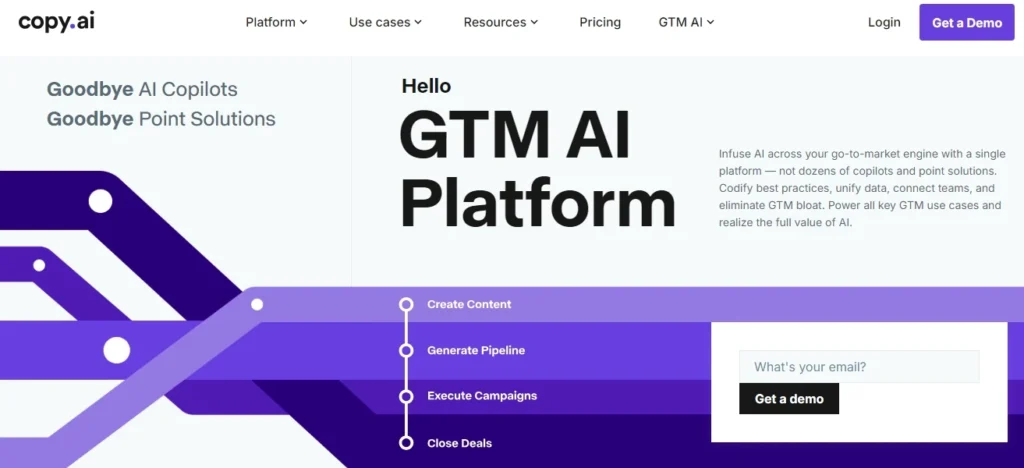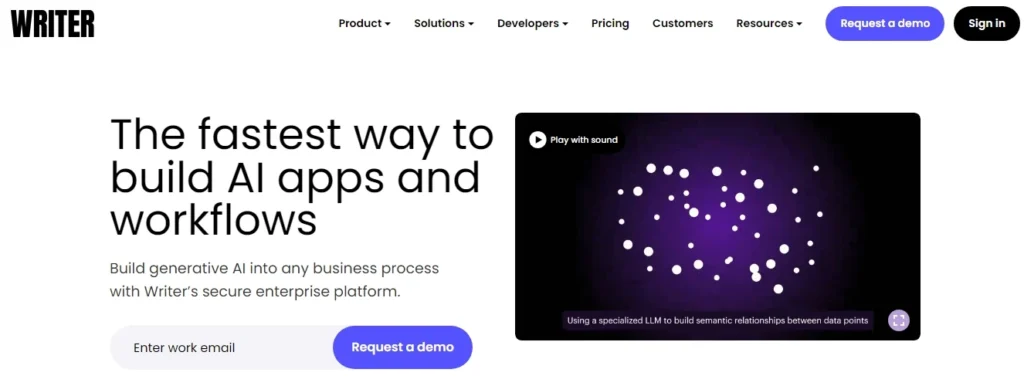Content creation has become a cornerstone for businesses, bloggers, and marketers alike. With the surge in demand for high-quality, engaging content, the need for Artificial Intelligence (AI) tools for content writing has become a necessity. AI tools have transformed the writing standards, enabling creators to produce compelling content faster and more efficiently than ever before.
This article delves into the best AI tools available in 2025 for content writing, exploring their features, benefits, pros and cons.
1. Jasper AI: The Best AI Tool for Marketing Content Writing
Jasper AI, formerly known as Jarvis, has carved a niche for itself in the content writing industry, particularly among marketers and business professionals. Known for its versatility and efficiency, Jasper AI offers a plethora of features that make it a go-to tool for long-form content creation, including blog posts, articles, and marketing copy.

Key Features:
- Templates Galore: With over 50 templates, Jasper AI caters to diverse writing needs, from product descriptions to social media posts.
- Multilingual Support: The tool supports content creation in 25 languages, making it ideal for global businesses.
- SEO Integration: Jasper AI integrates seamlessly with tools like Surfer SEO, ensuring content is optimized for search engines.
- Tone Customization: Users can adjust the tone of their content to suit the target audience.
Pricing:
- Creator Plan: $39/month per seat (1 user seat, 1 Brand Voice, SEO mode access).
- Pro Plan: $59/month per seat (up to 5 seats, 3 Brand Voices, 10 Knowledge Assets).
- Business Plan: Custom pricing for enterprise-grade features and unlimited usage.
Use Cases:
- Crafting persuasive sales copy.
- Generating blog content with SEO focus.
- Creating engaging email campaigns.
Pros:
- Highly intuitive interface.
- Continuous updates and improvements.
- Wide range of templates.
Cons:
- Subscription cost might be high for individual users.
- Occasional inaccuracies in facts or data.
2. Grammarly: Best AI Writing Tool for Editing and Proofreading
Grammarly is a household name in the world of writing tools. While it started as a grammar and spell-checker, it has evolved into a comprehensive writing assistant. Grammarly is designed to enhance clarity, consistency, and tone, making it invaluable for writers across industries.

Key Features:
- Tone Detection: Understand how your content might sound to readers.
- Clarity Suggestions: Simplify complex sentences for better readability.
- Plagiarism Checker: Ensure originality by comparing your content against billions of web pages.
- Style Guide Integration: Businesses can create a custom style guide to maintain brand voice.
Pricing:
- Free Plan: $0/month (basic grammar and spelling corrections, tone detection).
- Pro Plan: $12/month per user (billed annually; full sentence rewrites, unlimited suggestions).
- Enterprise Plan: Custom pricing for organization-wide use with advanced security features.
Use Cases:
- Academic and professional writing.
- Editing and proofreading.
- Maintaining brand consistency in team-written content.
Pros:
- Real-time feedback and corrections.
- Integrates with platforms like Google Docs and Microsoft Word.
- Free and premium plans available.
Cons:
- Advanced features locked behind a paywall.
- Sometimes overly prescriptive with suggestions.
3. Copy.ai: Best AI Tool for Automating Writing Tasks
Copy.ai has emerged as a robust solution for automating repetitive writing tasks. Focused on boosting efficiency, Copy.ai’s workflows and templates simplify everything from blog posts to social media captions.

Key Features:
- Workflows: Create repeatable processes to save time on similar tasks.
- Customizable Templates: Choose from pre-set options tailored to specific needs.
- Collaboration Tools: Teams can collaborate and refine drafts seamlessly.
Pricing:
- Free Plan: Free forever (1 seat, 2,000 words in chat).
- Starter Plan: $49/month (unlimited words, private community access).
- Advanced Plan: $249/month (up to 5 seats, advanced workflows).
Use Cases:
- Automating blog-to-social media repurposing.
- Checking content for plagiarism.
- Streamlining email campaigns.
Pros:
- Efficient for repetitive tasks.
- Offers a free trial.
- Customizable workflows.
Cons:
- Limited creative writing features.
- Requires a learning curve for workflows.
4. Writer.com: Best AI Writing Tool for Businesses
Writer.com stands out by prioritizing business-grade writing with high security. Leveraging its proprietary Palmyra Language Models, Writer.com ensures data safety and precision.

Key Features:
- Grammar and Style Checks: Offers inclusivity and clarity suggestions.
- Apps for Specific Needs: Includes blog builders, recap tools, and notification creators.
- Terms Management: Save custom terms and frequently used snippets.
Pricing:
- Team Plan: $18/month per user (up to 5 users; includes prebuilt apps and basic admin tools).
- Enterprise Plan: Custom pricing for advanced features like API access and multiple team setups.
Use Cases:
- Editing technical documents.
- Ensuring compliance with brand tone.
- Streamlining internal communication.
Pros:
- High security.
- Tailored for business use.
- Detailed customization options.
Cons:
- Many features require enterprise plans.
- Limited for creative writing.
5. HubSpot Breeze: Best AI Tool for Business Content Writing
HubSpot Breeze is a comprehensive AI-powered tool designed to automate and enhance various aspects of business content.

Key Features:
- Content Agent: Generate blog posts, emails, and landing pages.
- CRM Integration: Automatically logs conversations and follows up.
- Customizable Outputs: Adjust tone, style, and length of generated content.
Pricing:
- Starter Plan: $15/month per seat (basic marketing automation).
- Professional Plan: $800/month (includes 3 seats, advanced features).
- Enterprise Plan: $3,600/month (includes 5 seats, custom reporting, multi-touch attribution).
Use Cases:
- Drafting professional emails and blogs.
- Managing customer relationships.
- Summarizing CRM data for reporting.
Pros:
- Integrates seamlessly with HubSpot.
- Enhances team productivity.
- Offers a free tier.
Cons:
- Requires HubSpot ecosystem.
- Limited features on free plan.
6. Buffer AI Assistant: Best AI Tool for Social Media Content
For social media managers, Buffer’s AI Assistant is a game-changer. It focuses on creating platform-specific content tailored to different audiences.

Key Features:
- Platform Optimization: Customizes tone for LinkedIn, Instagram, and Twitter.
- Post Editing Buttons: Quick tweaks for rephrasing or expanding posts.
- Idea Generation: Suggests fresh content ideas based on business and audience.
Pricing:
- Free Plan: Free forever (up to 3 channels, 10 scheduled posts per channel).
- Essentials Plan: $5/month per channel (unlimited posts, advanced analytics).
- Team Plan: $10/month per channel (content approval workflows, unlimited users).
Use Cases:
- Generating personalized social media campaigns.
- Repurposing high-performing posts.
- Managing cross-platform consistency.
Pros:
- Free to use.
- No credit limits for AI usage.
- Beginner-friendly.
Cons:
- Limited to social media.
- Basic features for advanced marketers.
7. Sudowrite: Best AI Writing Tool for Creative Content
Sudowrite is designed for fiction writers and creative storytellers. It helps overcome writer’s block, generate ideas, and build rich narratives.

Key Features:
- Story Engine: A workspace for plotting and outlining.
- Description Tools: Generate sensory-rich descriptions.
- Rewrite and Brainstorm: Refine drafts or develop plot ideas.
Pricing:
- Hobby & Student Plan: $10/month (225,000 credits per month).
- Professional Plan: $22/month (450,000 credits per month).
- Max Plan: $44/month (2,000,000 credits per month).
Use Cases:
- Writing novels and short stories.
- Enhancing character development.
- Experimenting with creative formats.
Pros:
- Tailored for fiction writing.
- Encourages creative thinking.
- Affordable plans.
Cons:
- Limited to fiction-focused users.
- Not ideal for technical or marketing content.
Conclusion
The rise of AI tools in content writing is a game-changer for creators, marketers, and businesses. By automating repetitive tasks and offering advanced features, these tools allow writers to focus on creativity and strategy. Whether you’re a seasoned professional or a budding content creator, leveraging these AI tools can help you stay ahead in the competitive content landscape.